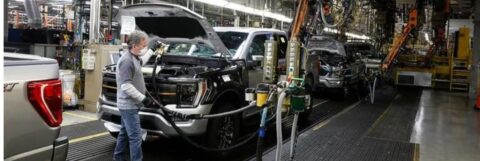Negotiations are underway between the UAW and Detroit Three automakers. Currently, labor contracts expire on Sept. 14. As the global leader in automotive and mobility, these negotiations are critically important for Michigan’s – and the nation’s – economy. MichAuto and the Detroit Regional Chamber are closely monitoring these talks.
The newly elected leadership of the UAW is taking a more aggressive stance than in past negotiations with an extensive list of demands. Most industry experts and observers expect a work stoppage of at least one auto manufacturer, or perhaps even multiple firms. The posture of the UAW mirrors that of a more aggressive organized labor movement occurring nationally and across the globe.
The impact of a potential work stoppage by the UAW will have sizable economic impact, especially in Michigan and the Great Lakes region.
- The 2019 six-week UAW work stoppage against General Motors cost the company nearly $4 billion.
- The already fragile supply chain would face additional challenges in the midst of a work stoppage.
- In addition to the 150,000 UAW workers idled during a work stoppage, likely hundreds of thousands of other jobs (e.g., other unions acting in solidarity, and local businesses reliant upon business from UAW workers, such as eateries) will be affected.
- While inflation has been down sharply, a work stoppage constraining the supply of new automobiles will create inflationary pressure.
- Financial markets have already responded to the negotiating posture of the UAW, driving down share values of the Detroit Three. BofA Securities provided impact analysis that confirms what markets are witnessing now.
Background
In the aftermath of the Great Recession, the U.S. automotive industry went through massive change – resulting in a much leaner, profitable operating model and globally competitive products. Despite the concessions made, the unions, and the operating reforms by the companies, the Detroit Three firms continue at a cost disadvantage compared to rivals.
- Detroit Three hourly labor costs: $64
- Foreign ‘transplant’ hourly labor costs: $55
- Tesla hourly labor costs: $40-50
These cost disadvantages don’t even consider the growing dominance of the Chinese automotive industry (operating at less than $10 per hour) or labor costs in Mexico.
While demand for automobiles continues to be high in this post-pandemic environment, the road ahead for the U.S. automotive industry is potentially bumpy.
- Investment and development in electric vehicles – which will continue to lose money until scale can be achieved.
- In the growing market for EVs, China has a clear lead in this technology and continued cost advantages. Chinese automotive companies are now dominating their domestic market (declining reliance on foreign brands) and are aggressively exporting their vehicles – with the U.S. market in their crosshairs.
- The longer life span of today’s automobiles coupled with a potential economic slowdown in 2024 could dampen consumer demand.
- Global supply chains are recovering, but remain fragile, putting future production again at risk.
Where Industry Needs to Go vs. Where the Unions Want to Go
U.S. auto manufactures face a complicated future – and a hugely expensive one with unprecedented investments in electrification and other new technologies. In order to accomplish this, manufacturers will need to increase their level of workplace flexibility, continue to narrow the cost gap with domestic and foreign competitors, and quickly respond to changing market demands. One of the ways automotive companies have compensated for this is with profit sharing that allows workers to share in the success of the company.
The aggressive list of demands by the UAW leading up to negotiations would increase labor costs for the Detroit Three to $100 per hour, according to The Detroit News. These demands include:
- Elimination of wage tiers
- Substantial wage increases
- Restoration of cost-of-living allowance increases
- Defined benefit pension for all workers
- Reestablishment of retiree medical benefits
- The right to initiate a work stoppage over plant closures
- Limits on the use of temporary workers
- More paid time off
- Increased benefits to current retirees
What’s Next
The MichAuto and Chamber teams will continue to monitor and provide updates to members as these discussions unfold and the contract deadline approaches. The nuanced process of determining manufacturing workers’ wages and benefits could pave the way for Michigan’s automotive future. The industry’s strong foundation of current investments and commitments – as well as those to come – should position the state well amid the sweeping changes.

